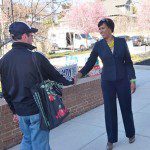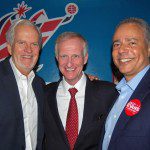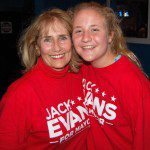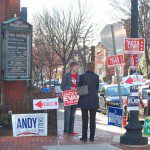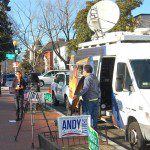With Bowser Win, D.C. Gets Ready to Enjoy Spring
By • April 11, 2014 0 740
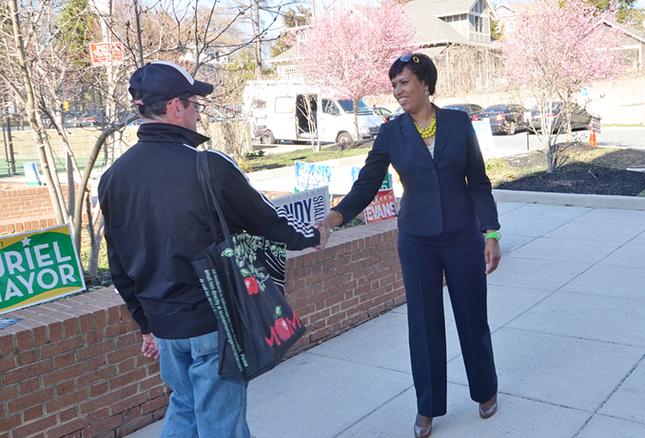
If there were two constants over the last several months in the District of Columbia that people complained about, they were, no question, the prolonged and seemingly endless bouts of cold, snow and rain that amounted to unusually bad weather and the prolonged political campaigns and bouts of candidate forums that led up to the April 1 Democratic primary.
Well, folks, look outside—the sun is shining and the Washington Nationals’ opening day is Friday, Bao Bao has gone outside and the cherry blossoms may soon follow. Check your newspapers. The campaign is over, and Muriel Bowser is the Democratic Party nominee to run for mayor in November.
In short, happy days are here again. Or are they?
It’s a long seven months until November, but already the Washington Post and political observers in general are speculating about the outcome of the general election in which Bowser will take on Independent David Catania, a veteran District council member with a high profile. The Post, whose endorsement of Bowser gave added momentum to her campaign, is speculating whether Bowser can be as good a mayor as she was a candidate.
Bowser, who was in her seventh year as council member from Ward 4, was a very good candidate, improving at almost every forum and public opportunity which she encountered. The Post endorsement was critical, because it was followed by numerous, mostly favorable articles and columns on the editorial page and the Metro and other sections. But it was also true that Bowser at every turn presented well, whether at rallies, Metro stops or in forums, televised or public all over the city. If she was thin on policy specifics, she proved to be impressive in the kind of show-and-tell forums that stacks up candidates against each other for comparison in a public forums, she was strong in the way she handled herself—although occasionally thin-skinned, when criticized—and made a favorable impression.
If Mayor Vincent Gray — who waited until just about the last possible moment to declare publicly that he would run for re-election — was obviously hurt by the late-in-the-campaign campaign stunner of businessman Jeffrey Thompson’s plea bargain with the District Attorney Ron Machen’s office. Thompson alleges that the mayor knew about the shadow campaign he ran in the course of the 2010 mayoral campaign. It proved certainly to be a boon for Bowser, if not for everyone else in the campaign.
Bowser’s campaign, it must be said, never stumbled and consistently surged moved ahead, first separating itself from her nearest rivals behind her—Ward 6 councilman Tommy Wells, Ward 2 councilman Jack Evans, at-large councilman Vincent Orange and Busboys and Poets owner Andy Shallal, all of whom hovered together far behind her as the campaign hits its final days. Wells, in the end, finished third with 13 percent, and Evans suffered a precipitous drop in the same lat days into single digits, where he was joined by Orange and Shallal.
Bowser’s campaign never stopped surging, catching up with Gray, who had had the lead for most of the campaign, and then passing him in the polls. Predictions were being bandied about that Gray could still win, if he benefitting from low turnout and the vote in mostly African American wards like Wards 7 and 8.
The sun came put on election day, normally a sign of a high turnout, but that was not to be. Voter turnout was low — and very low at 22 percent. Gray did not surge in his stronghold, nor did he really benefit from having the endorsement of Marion Barry. Bowser breezed in impressively with 44 percent of the vote, leaving Gray in the dust at 32.3. Wells finished with 12.6 percent; Evans, 5.0 percent; Shallal, 3.3 percent; Orange; 1.9 percent. Gray took wards 5, 7 and 8, but it wasn’t enough. Bowser won every other ward, including Ward 2 and Ward 6, supposed strongholds of Evans and Wells.
In fact, Bowser followed former D.C. Mayor Adrian Fenty’s pattern to victory: she won in the predominantly white wards, plus picking up her own Ward 4, plus Ward 6.
One reporter already called her presumptive mayor, which seems a little presumptuous. In any case, it means that Gray will remain mayor to fill out his term unless he gets indicted and there is a trial or more revelations come out that may make him rethink his position. Bowser is already preparing for her campaign to be elected. People are still wondering about her lack of experience, or just wondering, but also duly impressed by her campaign.
Change as a rule was not in the air in the election, although there were exceptions, especially in Ward 1, where the youthful Brianne Nadeau, who hounded 15-year-council veteran Jim Graham on past ethics problems, prevailed by some 1,700 votes. She, like Bowser, will face a challenge from a formidable Independent foe, Brian Weaver.
In other races, Charles Allen, Tommy Wells’s former chief of staff, prevailed over Darrel Thompson for the Ward 6 seat left open when Wells ran for mayor. At-large incumbent Anita Bonds managed to hang on to her at large seat, fending off challenges by Nate Bennett-Fleming and John Settles. District Council Chairman Phil Mendelson won re-election, as did Kenyan McDuffie in Ward 5 and Mary Cheh in Ward 3.
Tomorrow: Atlanta at Nationals, play ball.
- Winner Muriel Bowser at Chevy Chase Community Center on primary election day, April 1. | Photo by Patrick G. Ryan

